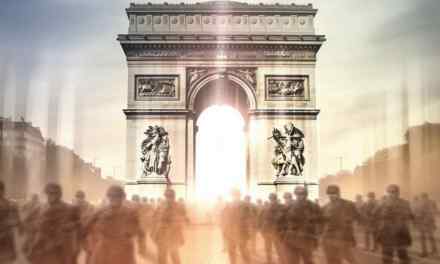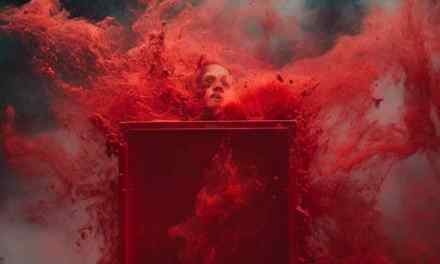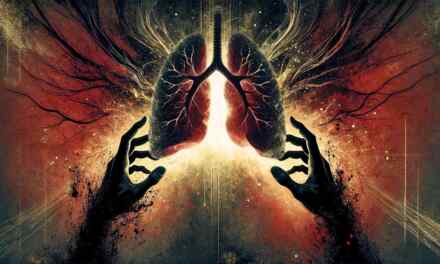If the shuffle’s been thorough, the next hand is random. The cards emerge as bequeathed by chance, either with some splendid combination that guarantees a win, or more often with no synchronicity whatsoever, a collection of images that means nothing and therefore functions as a loss. All wins are temporary, and all losses more than you can afford.
But if you’re at the tables, you play.
Shuffle, and winning or losing depends entirely on the order in which they land.
First Card
It was before or afterward, the same day or another.
Fortune entered the gaming floor, where instead of heading straight for a table she wandered among them with no apparent destination, noting the places where people wept, the places where they howled like wolves, the circle of players who stared with vacant eyes and gaping jaws at nothing in particular, emptied but not yet judged broke and ushered from the premises.
She was dressed in a silvery beaded gown, one with many small windows where the black of her skin appeared in crescents, designed for contrast. It was cut to entice, to show off the gleaming star tattoos on her shoulders and the birds fluttering along her flat belly. Many were the players, male and female, who the spectacle had lured into fantasy and driven to forget the game in front of them. Or so she understood. The precise order of things was somewhat vague this morning, as it tended to be from time to time, but no one wakes in a suite, with a closet full of finery designed to escalate her natural beauty into the realm of the spectacular, if she has not been successful, if she has not been rewarded or comped.
Her instincts, stronger than most, told her that the phenomenon she’d commemorated in her very name was not to be found yet, so she made her way to one of the many bars, a black square at the center of all the hubbub where the number of drinkers currently numbered a grand total of one. That one was an obese, florid white man with watery eyes and veined nose. He had an unfortunate port-wine stain, about the size of a quarter, just over his right eyebrow. His black suit looked like it had once suffered the indignity of fitting him well, but which now hung loose in the belly and the chest, testifying that he’d lost significant weight, not that he seemed to know it. Fortune did not sit down next to him but around the corner, welcoming and enabling conversation. His eyes did the thing that the eyes of certain gentlemen do, when dazzling young women like Fortune sit down near them; they note and appreciate the sudden presence of beauty, but do not then proceed to any insulting calculations.
“Evening,” he said.
“Is it?” Fortune asked. “I’ve lost all track of time.”
“If that’s all you’ve lost,” the old man said, “then you’re ahead of the house. May I get you a drink?”
Fortune assessed the odds that he expected more than conversation in return, estimated them as minimal, and said, “That would be lovely. But just a coffee.”
The bartender was a petite, spiky-haired young woman, topless and tiny-breasted and tattooed along the clavicle with a pattern of startlingly blue, long-lashed eyes. Her own eyes were sharp and knowing, and when she came over, she gave Fortune a napkin upon which she’d written a few sentences in blue ink. She made a point of tapping the legend and making damned sure that Fortune read it. This she did.
He’s harmless. He’s broke, but he doesn’t know it.
Someone will collect him sooner or later. In the meantime, people are treating him.
Will you cover the tab and pretend he’s paying?
[ ] Yes, I’ll Humor Him.
[ ] No, but Thanks for Warning Me.
Fortune touched a gloved fingertip to her forehead and selected among the many recent winnings a moment she did not care for.
She is small. She is a child, male or female she does not know, but male seems likely; there’s a certain boy-flavored tinge to the way she regards the landscape before her, a mowed green lawn ending in a curb and beyond that a street. A dog larger than herself, a familiar dog—the family dog of the person whose memory this is, a mix that appears to have some greyhound in it—spots her on the other side of the street and barks like a lunatic, overjoyed in the unrestrained manner that makes dogs so easy to love. It calculates a direct line between itself and the child, and launches itself into a full-on gallop. But there is a car about to intersect that path and the child can see the inevitable result of the dog’s charge, even as the chance to prevent tragedy contracts to zero. The horror spikes, and that is the end of the memory, and there was no reason to hold on to it, none at all, especially since it was not part of her own life. It was nothing anyone would want to hold on to, and therefore nearly worthless, but it would pay for her coffee and the drink of the seedy obese man, with enough left for a tip.
It emerged in the form of a flat rectangle exactly the size of a Three of Diamonds, or Queen of Spades, or any other card, had this been a place where the bets were merely money. It glowed like a miniature star, but seemed to fade at the edges, like smoke. She slipped it into the palm of the bartender and watched the bare back, decorated with a tentacle-porn tattoo, writhe with every step.
A second later that bartender filled her coffee and topped off the fat man’s cocktail, and left them to the business of strangers, conversing when there was nothing between them.
He said, “My name’s Desmond.”
“Are you sure of that?” Fortune asked.
“Fair lady, I may not recall it, not in the sense that I can summon it spilling from parental lips, but it is the one thing I have that I can still say with absolute authority belongs to me. In my pocket I carry identification that shows my face and my name, and even my prior place of residence, though I cannot say just how far away from here that might be. I presume it to have been the domain of those with means, even if I possess little in the way of hard currency at the moment, having yet to cash out.” His smile had the duration of a twitch. “And you, young lady?”
“Fortune.”
“Ah. I can safely say that I have been here for a long time, without previously making your acquaintance.”
It was a glib line, one of many variations that had followed her around all her life. She had a whole deck of them. Her mother: I called you that because you’re my fortune, baby. From leering men: Are you a good fortune or a bad fortune? From the envious: With a name like that, you must be lucky all the time. She had come to judge strangers by which one they went for. The fat man’s was almost charming, and so she offered him the pleasant smile he wanted, and said, “Bad streak, eh?”
“I can only assume. I possess no recollection of it. I possess no recollection of anything, really.”
“What do you remember?”
Ice clinked as he lifted his glass to his lips. “Drinking.”
“Is that all?”
“Hardly all. I remember standing on a mountaintop, and watching a glorious sunrise appear over a distant ridge. I remember being on a narrow street and crouching behind a parked car so that I could be violently ill, in something approaching privacy. I remember being a young girl, a teenager really, squealing in terror at the agony of childbirth. I remember looking down at the expansive arc of my big fat belly, realizing, this is my shape, now; this is the fat I will always have, and coming to terms with it. I remember blood spurting from a fresh wound in my throat, as I died. I remember lying in the center of a vast circular bed, with spent lovers to my right and left, another of indeterminate gender bobbing away between my legs, and all my attention devoted to a small water-stain, the size of a quarter, on the ceiling above. I remember being in orbit, looking down at the coastline of North America, while bright white spots flared, too bright to see. I remember moving my bowels, eating chocolate, being up to my neck in cold water, being punched in the face, and people calling me many names, some of them familiar if not the easiest to identify. I remember a woman calling me Desmond. Everything beyond that is fragmentary.” Another sip, and he brightened. “And of course I remember meeting a delightful young woman with an even more delightful name; latest and most splendid of the moments I do possess. What do you remember?”
“Some of the same things,” she said. “Some quite different.”
“How many are yours?”
“Most, I think. I’ve been up more than I’ve been down. But I’ve only been here a little while. I haven’t lost anything I didn’t want to.”
“Can you share something special? Not private. I know how valuable that is. But it has been a long morning and I can use a taste of glory, even if it’s only reflected.”
She considered that. In this establishment it had always been wisest to hold one’s cards close, lest anyone you might later play got some advance estimate of their value; but this poor man was unlikely to play again, and he was not asking for anything more than people outside these walls shared all the time, in conversation. He didn’t even know that she’d paid for his drink, and it was that thought, more than anything else, that gave her the necessary impetus. “My first taste of pear. My mother and father didn’t like them and never kept them in the house. But my grandmother brought one, one day. I thought it was deformed apple, and she said, ‘No, this is better than an apple.’ I accepted a slice and it was, it was. I’ve loved pears, ever since.”
“Ahhh.” He closed his eyes, appreciating. “That is special, all right. Thank you, Fortune. How’s your coffee?”
She raised her cup. “How’s whatever you’re drinking?”
“I would say I drink to forget, but that, of course, would be redundant. Are you playing today?”
“I am.”
“Then,” raising his in a toast, “I wish you a day that honors your name.”
“And I wish you one that honors yours.”
She drained half her mug in a single gulp, wincing because of the heat, but also aware that this encounter had taken on a momentum that needed to be arrested, as soon as possible. The best way was sheer bribery, and she found it, right there on the surface, with a memory that like the previous was of little particular value: just enough for one hand, played at minimum bet, at one of the cheaper tables. A woman walks by trailing a miasma of sickening perfume. It is the aroma only encountered when the wearer of the scent has not employed a dab, but a splash; it proceeds her like a plow, trails behind her like a rake. His nose stuffs up in protest. His eyes water. He gags. Another figure, one he knows but cannot place, a tall thin man with hollow cheeks, leers in empathy. She placed the card before him, and said, “Here; place a bet for me. I have a hunch that restarting you will give me karma points today.”
“I could never,” he replied, but his refusal was so pro forma his hand already cupped around the card.
She took her coffee with her and—
Second Card
It was before or afterward, the same day or another.
Fortune was spent. She felt the bone-weary exhaustion that testified to sleep deprivation, to long hours spent sitting at a table, breathing in smoke and the stench of failure.
There were four players with her, fanned about the curve of the table like a peacock display.
There was a young Asian man, hair-gelled and sculpted, the upper limits of a neck tattoo poking just above his collar; a very old white woman, pale as milk, looking less than a hundred breaths from her fatal myocardial infarction; a thick-necked black man, dark as herself, but possessed of an odd white scar just above his left eyebrow; a red-headed white man, grinning too desperately, drunk on things other than the thrill of chance.
They all had glowing cards on the table.
She could not recall sitting down, could not recall pursuing her losses into a deeper hole, could not recall anything that had reduced her stack to the mere five cards lying face-down on the green velvet before her. But the sight of her own arm, resting on the table’s padded bumper, distressed her. The sleeve of her beaded white gown, the one that had once dazzled with its elegance, now looked frayed, sprouting threads, worn gray with accumulated filth. She could only wonder how long it had been since she’d changed, let alone washed.
Everybody stared.
The dealer said, “You need to bet.”
She blinked, glanced down at her own space, saw it empty, and was for a moment baffled as to what the masked figure expected her to do. The mechanics of betting eluded her, the precise meaning of the word “ante” eluded her, and she wondered if these were among the things she had lost.
What followed was muscle memory, not conscious planning. She pressed a fingertip to her forehead and drew forth a part of herself that, not so long ago, she would have sworn never to wager, no matter what.
She says, “Is that an apple?” and the old woman beams, in the manner that is always so delightful to look at. She does not smile the way Fortune’s father smiles, which is only with his mouth; when he smiles, none of the expression touches any part of him above his lips, staying completely away from his eyes, which always remain sad and penetrating. Her father does not have the knack of smiling. He is not a bad man, but smiles, and warmth, elude him. But this woman, his mother, has the gift that skipped his generation, the gift of warming any space with the heat of her delight, and this she does, as she chuckles and tells the little Fortune that, no, this is better than an apple, this is something else, a pear. She asks, “Do you want to try one?” and Fortune says yes. With a flash of her tiny knife the old woman amputates a sliver and hands it over. Doubtful at first, feeling the inherent conservatism of the young who prefer the familiar above all things, but trusting of the grandmother who has always been so kind to her, the little girl places it in her mouth and oh the taste THE SWEET TASTE
It was too valuable a remnant to risk, really, but it was one of the few substantial memories she possesses valuable enough to compete with what was already on the table, and Fortune was as capable of being ensnared by the sunk-cost fallacy as anybody else in this noisy and glittering place, and so she set the glowing card down, and waited for the verdict of chance.
The dealer nodded. It was an inhuman nod, which was only to be expected. Fortune knew that once upon a time, maybe an hour ago and maybe when she was young and fitting of the once-glamorous clothes she wore, she had known what he was, but that was knowledge she’d gambled away long ago, and so she could not place his origins, or his nature; or what his true features must have been, beneath the silvery faceted mask that lent him the character of a mirror, always reflecting the features of the gamblers back upon them.
He revealed his own cards.
At this particular game, the players bet against the Dealer’s hand, symbols picked from a stack of cardboard-stock images with no fealty to the traditional fifty-two-card deck. It was a given that no symbol ever appeared twice and that the rules that dictated whether any player won or lost were beyond all gamblers’ ken; the house kept track. So Fortune did not know whether she would gain possession of the memory of her introduction to pears, or lose it forever; she did not know whether his pregnant pause preceded good news or bad. She just sensed something special about his intake of breath.
And then he said, “Jackpot.”
She barely understood what was happening until he paid off enough memories for a lifetime.
They were not her original memories, of course. The ones she had lost, since the downward turn in her luck, had been churned by play; some of them had ended up in the heads of other players and many had ended up in the coffers of the House. What she got now were the moments lost by untold other players, many lifetimes worth: life in a thousand different homes, love with a thousand separate partners, the sensation of hang-gliding, of carrying a weapon in war, of being head-butted by an affectionate tiger, of being screamed at by a hundred enraged strangers, of diving into any number of different waters. She remembered being young and being fat, and being white and being black, of being the woman she was among many, many others, and of being untold men. It was a taste of being every single person in a crowd, simultaneously, and they bumped together in uncomfortable ways, but after a few seconds they settled in their new container, not forming a coherent narrative, as that was impossible, but at the very least filling her, making a new version of Fortune that was not quite the one who had sat down to play. She was dizzied by it and she knew that she would need some downtime to process it all. Amidst the cheers of her fellow players, she reclaimed the memory of her first exposure to pears, was for a heartbeat that little girl daring the unfamiliar, and she said, “I think that’s it for me, for a while. I’m well past turning in.”
It was not quite as simple as that, of course, as among the information she no longer possessed was her room number, and so she had to stop by the concierge to find that out. But she got the information that she was in 9733, got the spare key that would admit her, and headed on up.
The elevator was unfortunate. It was one of the kind with mirrored walls and ceiling, as well as floor, and so she faced an infinite series of versions of herself, extending to the end of the universe in all direction. The silvery beaded gown had gotten a bit shabby, all right. Some of the artful almond-shaped windows had become outright tears, and there were places where it showed the strain of a body that could no longer be easily forced into it. Her makeup showed the signs of desperation. She gazed at the bags under her eyes, and her crow’s feet, and the gray hair that had become loose and unkempt and places, and she reflected that she did not remember growing old.
No, that was not quite accurate, not at all.
She did not remember what it had been like to be Fortune, and to grow old. After her winnings, she had fragments of the memories of any number of other people, reflecting on their own decaying belly. She remembered being a man gazing down at the curve of his own pendulous belly, thinking that he really had to make a greater effort to lose some weight, or he might never see his own penis again. She remembered being a woman of a certain age, at the moment she found out that her husband had found somebody new, and thinking that this never would have happened if she still had her beauty. She remembered the epiphany, from any number of men and women, that they once would have taken the current flight of stairs at a run, and not at the pained trudge that time had left them with. But she did not remember it happening to her. She could only wonder how long she had been here.
On the four hundredth floor, the bell dinged. The door opened and a man entered; an extraordinarily fat man, of the sort so weighty that it was wonder he was ambulatory at all. He looked prosperous, though, his massive bulk crammed into a shiny new suit, tailored to his bulk. He grunted as he entered, and at the moment they made eye contact, she saw that he had a port-wine stain, the size of a quarter, over his right eye.
She did not know him at all.
But his eyes sparkled with recognition. “Fortune! So there you are!”
And she recoiled—
Third Card
It was before or afterward, the same day or another.
Fortune was dining with a young man at one of the casino’s fancier establishments, on a balcony some seven hundred feet over the casino floor. She was radiant, clad in a ridiculously impractical arrangement of onyx feathers that only somebody foolish or wealthy would ever attempt, let alone someone wealthy enough to be foolish, which was her current condition. She had gone to one of the clothing emporiums and issued just this to the harried, faceless thing behind the counter: I want to be impractical. Her dining companion was colored gold and dressed in a loincloth. His name was Aura and it was a given that later, he would do anything she asked of him, at whatever length she asked it of him. It was one of the casino’s many services to its high rollers. But he was remarkably good at conversation too, filling the gaps with anecdotes that could not have come from his own life but had certainly come under this roof as the experiences of others, and for some time she had been listening with pleasant ennui, while she nibbled at the little winged delicacies that existed nowhere in any nature she knew.
Aura said, “Is there anything else you want me to tell you?”
She dropped the wispy-thin bones in the shallow plate set aside for that purpose, and said, “How about something horrible?”
He blinked. “Horrible?”
“You’ve been telling me about the women you’ve loved, the sights you’ve seen, the loving upbringing that made you, or at least the people you represent, the man you are today. How about telling me something horrible? I’m in the mood for something horrible, just this once.”
He placed his fingertips on the edge of the table, where his plate would have been had he been allowed to eat; but of course he owed too much to be allowed to dine, and so was kept alive by other means. His eyes were hungry. That was part of his appeal, of course. In a certain light, ravenous hunger looks like need of a more erotic sort, and it was therefore quite a delight to sit opposite him, nibbling on treats that once would have cost her a year’s earnings, and fantasize that what he really wanted was what he would later be obliged to do, run his hands over her flesh, and make love to her as if it was the very end of the world to him. Of course, once upon a time she would have been horrified at herself for finding pleasure in such a sadistic thing. But she had sold her conscience for a line of credit a long time ago, when things were more desperate, and she found herself running the risk of being reduced to a creature like him. It had given her the stake she’d needed to thrive since. She was one of the high-rollers, now; someone who could play for a lifetime, if she wanted; someone whose only memories were of the pleasures to be found in playing and in the distractions her winnings paid for when away from the table. Like this thing, like this boy. Aura.
And this was the arrangement that allowed her to demand that he think of something horrible, while sipping on a cocktail so divine that it made her feel, just a little bit, like God.
Then something disturbed her wait.
It was a stranger, a woman, a young woman, with waifish features and sleek black hair than formed a vertical slash to her waist; her lips painted an odd but becoming orange, her gown an incandescent thing that gave off its own light. She had a wobbly gait, in part because she was drunk and in part because she was wearing only one heel, so vertiginous compared to the height of her bare foot that she almost toppled sideways with every step she took. She was happy, showing teeth, and as she passed between the diners, her joy was so evident that she infected them with her cheer. Even Fortune, whose own happiness was an edifice, something that existed because she’d damn well put it there and would not allow it to be disturbed for any reason, felt a little happier, on her passage.
The young woman made her way to the waist-high balcony, peered over it, and beamed with the one thing none of the prosperous in all directions had, certainty.
She turned to address them.
“I don’t know who I am,” she said, simply. That smile never leaving her face.
And then she was gone.
The diners, arrayed in pairs or in singlets with companions who were not permitted to partake, nodded and returned to their meals. After a hesitation only slightly longer than theirs, Fortune did the same.
Then Aura said, “I have something—”
Fourth Card
It was before or afterward, the same day or another.
They had made it to their room in a kind of fever, barely dropping their bags before a wall-rattling embrace and a clumsy advance to the bed. They had made love twice, slept spooned, woken, ordered breakfast, eaten only half of that and made love again.
They did all this with the blackout curtains open, offering them a grand panoramic view of the glittering neonscape. Time did not seem to pass, which was not surprising, since they both knew that the sun never rose in this place. The concourse marked the seconds with the pulse of its neon, sufficient for their purposes, and with the lights turned low in the room, what illuminated the lovers instead of sun or stars was one diffuse burst of light after another, all garish, all shifting, like thunderstorms colored in crayon.
At one point, spent, Fortune and her man lay on their respective sides, studying one another with the fascination lovers have when still in the discovery phase of their time together. They each rested their heads on their hands and they watched the play of the shifting lights on each other’s skin; hers in outline, as her back was to the window, his more extensive, as she did not eclipse much.
Her man was lean and her man was beautiful, less a muscled Adonis than a streamlined Hermes, a figure of rangy limbs and elegant lines, the kind of man who, hunting in ancient times, might have been less likely to take down an antelope with a bow than to run it to exhaustion with his own tireless speed. She had only known him for days, but her breath already caught at the sight of him, her reserve already evaporated in the presence of him, her natural caution already scattered to the winds with his lightest suggestion. It was not that she had never felt this way before but that she had never felt this way, this much, this soon, and it took a genuine act of will to turn her thoughts from the here and now to the reminder that to follow him here, to this wholly mad place, she had simply abandoned the responsibilities of the everyday and taken off, leaving behind no word.
Her fingers twined his. “We’re not seeing much of this place, are we?”
“No,” he said, “we’re not,” as something resembling a blue starburst danced across his cheekbone and dissipated against his forehead. “We’ll go down sooner or later. Have some drinks. Play a little.”
“I’d rather keep on playing up here.”
“Oh, we’re not even close to done. We go down for an hour, maybe two, we’ll be more than ready to come right back up and start the next chapter, which I can tell you right now is going to be one for the books.”
She sighed, fell on her back, and—unable to keep the secretive smile from spreading across her lips—focused on the stars or star-shaped things dancing on the ceiling. He was immediately in hot pursuit, sliding across the coverlet to kiss her shoulder, right on one of her tattooed stars.
She said, “I guess we have to get up sometime. We’ve already tried the room service.”
He tilted his head. “There’s better eating here.”
“Smooth talker!”
With a laugh. “There are restaurants not on the room plan. And we can play.”
She said, “You can play. I’ve never spent more than forty dollars in a casino in my life.”
“This is not an ordinary casino. They don’t use money.”
“All the more reason. My memories belong to me. I’m not about to risk them on games I don’t know how to play. The whole idea scares the hell out of me. “
“You don’t have to play. I don’t even want to play all that much. Just a little bit.”
She rolled back on her side, there was a moment of adjustment, and they now faced each other from across a gulf of inches, eyes fixed on one another, half in challenge, half in acceptance. They fell into a silence that lasted long minutes, one that amounted to a conversation of a different kind: one that for a time seemed poised to further delay their departure for the gaming floor.
After a while, he rolled over on his back, and, addressing the ceiling, said, “It’s not so much what you can lose. It’s what you can win.”
“Such as?”
“Such as the kind of memories that you were never going to have anyway, because of the kind of person you are, the kind of experiences you never would have sought out, if it was only up to you. The last time I was here, I won some memories that must have been lost from one the bands that play in the big hall. I don’t know shit about music, that kind of music anyway, and I didn’t recognize the act. But I was right there, playing lead guitar, with, like, tens of thousands of people there, and these whirling circles of light catching what looked like a whole churning ocean of people, all cheering me as I went into a solo, and those sounds were, like, coming out of me. It was, I don’t know, for just a second there, what it must be like to be God. What I bet to win that? This time as a kid when I was climbing out of a swimming pool, slipped on the wet concrete, and split my knee open. Wouldn’t you prefer to have fewer of those, compared to what you could have?”
“I don’t know,” she replied. “It seems like an awfully slippery slope. What if you found yourself losing, and the only thing you had left to bet was your time with me?”
“Is that what you’re worried about?” He kissed her. “I’m never going to gamble that away. Not one minute. Not one second.”
“You never know, babe. Let’s build up your bank a little. Give you a little more to play with.”
And so it ended up being a little while before they left the room and descended to the playing floor—
Fifth Card
It was before or afterward, the same day or another.
Her stiletto heel snapped. Her knee buckled, and she almost went down to the ground, right there in the filth of the alley, with the rats and the garbage reduced to undifferentiated mush by rain; but her forward momentum just barely kept her upright, transforming what might have been a disastrous face-plant into careening forward momentum. She lurched a half dozen steps before catching herself, and for one long comic moment stood there, swaying, afraid of encountering broken glass, or worse, in the impenetrable darkness further in.
Then the shouts of the men at the mouth of the alley decided her. She had been making a desperate break for the vanished life she had come to think of, and mythologize, as the real world; one that she only still possessed in scattered bits and pieces, but which nevertheless still felt to her like the home she had lost, that would fix everything if she could only get back there. Just up and leaving for it had been an option, once, but her losses had become unmanageable and she’d had to borrow, repeatedly and at onerous rates, just to keep her head above water. What she owed in memory debt now was more than any living human being could pay. She owed the equivalent of libraries, had indentured her services to bad people just to have something in her head that wasn’t entirely fog, and was now so far behind that she would only be free again if she ran too far for them to ever catch up: hence that basically incomprehensible abstraction the real world, a place where their kind held no sway. She had run. And she had almost made it, getting only as far as these outlying streets before seeing them, a band of them, gathered on the road ahead.
The alley held nothing of promise but was a better option than letting those bastards drag her back.
So she tossed the broken shoe and, since it was useless without its mate, the good one, and she took the wet and sticky pavement with the bare soles of her feet, and another ten steps further in among the garbage smells and the nasty skittering sounds and all it cost her to remain silent as the uncertainties multiplied, she also reached into her forehead and pulled out one or two little fragments of her past or the past of others, to provide distraction and possibly slow them again. What she could spare, now, was nothing good—as anything valuable that ended up in her head, these days, always had to be turned in to those she owed. What she dropped, stumbling through the darkness, was still casino tender, but the lowest value of any cards.
She is old and broken, trapped for hours at the bottom of her apartment building stairwell, in agony from any move she makes, waiting for someone to find her and call an ambulance
He is young and at the top of the stairs, his little hands clutching the rails like prison bars as he gazes down at the living room sofa where his mother and father fire up their pipes, and he has not been fed all day and he knows that there’s some bread in the refrigerator and he can go and get some if he can just wait for them to fall asleep
Not sure whether this comes from a man or woman, but whoever it is lies belly-down in muddy earth while a crowd of hooting others kick him or her in the ribs
Bits. Pieces.
Fortune doesn’t eject anything that belongs to her, the her that was and not the patchwork she’s become, because she wants to hold on to any experiences that actually seem to come from her, and so she hesitates when the next one to emerge from her forehead, tangled up with her fingers by strands of dreamstuff, is an inconsequential fragment of a moment’s kindness shown a bereft fat man at one of the casino’s many bars: a reminder that once, when she was already on the way down but still had more of herself than she does now, she could still afford to throw away some of what cluttered her skull, as charity. It could not have been all that long ago, really, since the version of Fortune making her way to the fence at the rear of the alley, a fence she can barely make out only because of the fragmentary glittering starlight against the chain-link, is not much older than the version of herself who allowed the old man to think he was the one buying her a drink. Judging from the last time she’d looked in the mirror before making her run for it, and from nothing else—because time had a way of losing all definition when you’ve given up so much of what fills it—that could not have been more than a year ago, maybe two; maybe as little as a month. She hoped not. But she’d seen it happen to others. When luck turns, it turns fast.
She reached the chain-link and started to climb, not planning beyond this obstacle, putting aside whatever trouble would come once she got to the other side. Her nails were long and glossy-red and one snapped against the wire as she pulled herself up, terrified now because escape, even temporary escape, was so close. A flashlight beam swept against the side of her face and she heard voices behind her say,
“There she is!”
“Come on, Fortune, you’re smarter than this!”
“We should have let you remember what happened last time!”
And she did not know why, but that last voice terrified her most of all, not because she could place a name or assign a face but because she knew the attitude, knew that it had faced her down before, told her in precise mathematical terms what she owed and what she would have to do to pay it back. It won’t be hooking, the voice said. We don’t make our profit that way. And she did not remember what he had next told her, what she had been doing for the casino ever since, that was so much worse than any other price that could have demanded of her mind or her body; she only knew that she would not do it again, that she would die rather than do it again. And she pulled herself over the top of the chain-link, hearing the footfalls hurrying behind her and knowing that this was going to be close, that only an eyeblink would define the difference between what unknown chances existed on the other side, and a cold hand seizing her by the ankle and dragging her back down.
The real world, whatever it was, beckoned.
The memory is hers. She has never wagered it. It is the sound of her own voice saying, “Okay, we’ll play a few hands. But just for a little bit. I want to go back to the room.”
Fingers brushed her ankle, but failed to find purchase or that more insidious thing, ownership, as she catapulted herself to freedom, and fell.
Free! Free! They’ll never get me again!
And she got up and ran—
Final Card
What she remembered now could have taken place on this day, or another.
She slept only as much as she had to to keep her body going. It was three hours, maybe four: not enough to dream, or at the very least not to have any dreams she could remember. This was not a problem for her. Dreams were pocket change, and the precise time she spent with them had no relevance to what life she had left. She always went to bed with the world out the window as black as a shroud and always woke with it the same color, not one more inch of it visible to her senses. It might as well not exist, and she suspected it did not. Either way, the dreamless interlude was enough to dispel the fog a bit: not all of it, certainly, because some of it was not exhaustion but emptiness. But enough that she could muster the energy she needed to shower, to dust her breasts with powder and her cheeks with glitter, and then to don the low-cut, form-fitting red dress she found hanging in her closet.
My name is Fortune, she reminded herself, and then she thought: Is it really?
She remembered being squat and fat, with bulbous cheeks as pockmarked as a moonscape. She remembered a body towering and willowy, a stick, really, stumbling through life with the awkwardness known only to those who don’t quite fit. She remembered making love to women and men as both women and men, she remembered being hideous and she remembered being dazzling. Herself was not an abstraction she recognized. But she was willing to believe that the name of this person was Fortune, or rather that the name currently lingering in her forebrain was Fortune.
She left her room knowing that in either event it might not be Fortune when she returned. It could be Alice or it could be Keisha or it could be Yoko and it could be no name at all, just a vestigial sense of self. Right now, it was enough for the name to be Fortune.
She went to the elevator and took the express one thousand levels down to the gaming floor, where amidst the dozen games she could have joined and a dozen others she wanted to join, any number of places where the opportunity for a big win beckoned, but now it turned out that her body was protesting at having been roused from bed after so little in the way of rest, and so a drink became necessary.
That may have been just a few minutes ago and it may have been some other day. There was no telling. But here she was, sitting at the corner of the bar, thinking of nothing in particular, and aware that she had been thinking of nothing in particular for quite some time. The ellipsis between her departure from the room and her current restored awareness was a void that could have been of any volume, including entire lives she had not lived. That is one feature of casinos, after all. They are designed to make you lose all track of time, and sometimes of yourself.
There was a man sitting just around the bend: one who seemed to know her. He was a fat man, prosperous, clad in a suit that had the look of something worn for the very first time this very day, and he was clearly somebody who’d been winning.
“Evening,” she said.
“Is it?” he asked. “I’ve lost all track of time.”
She spoke her next words only because they came bubbling up through the fog, from the neglected places where we keep all the things that are not quite prominent enough for memory. “If that’s all you’ve lost, then you’re ahead of the house. May I buy you a drink?”
He cocked his head in consideration, and for what might or might not have been the first time she spotted the port-wine stain on his forehead. “That’s very generous of you, young lady. But just a coffee. I have a game to get back to and I need to keep my wits about me.”
The waitress went to him, and for a fraction of a second Fortune thought she spotted something off about their interaction, something about the napkin she had placed by his hands. He looked up, glanced at Fortune, and made some kind of decision; one that ended with the delivery of his coffee and the exchange of names.
And later, after he left, she was still sitting there.
It could have happened on this day, or another.
* * *
If the shuffle’s been thorough, the next hand is random. The cards emerge as bequeathed by chance, either with some splendid combination that guarantees a win, or more often with no synchronicity whatsoever, a collection of images that means nothing and therefore functions as a loss. All wins are temporary, and all losses more than you can afford.
But if you’re at the tables, you play.
Shuffle, and winning or losing depends entirely on the order in which they fall.
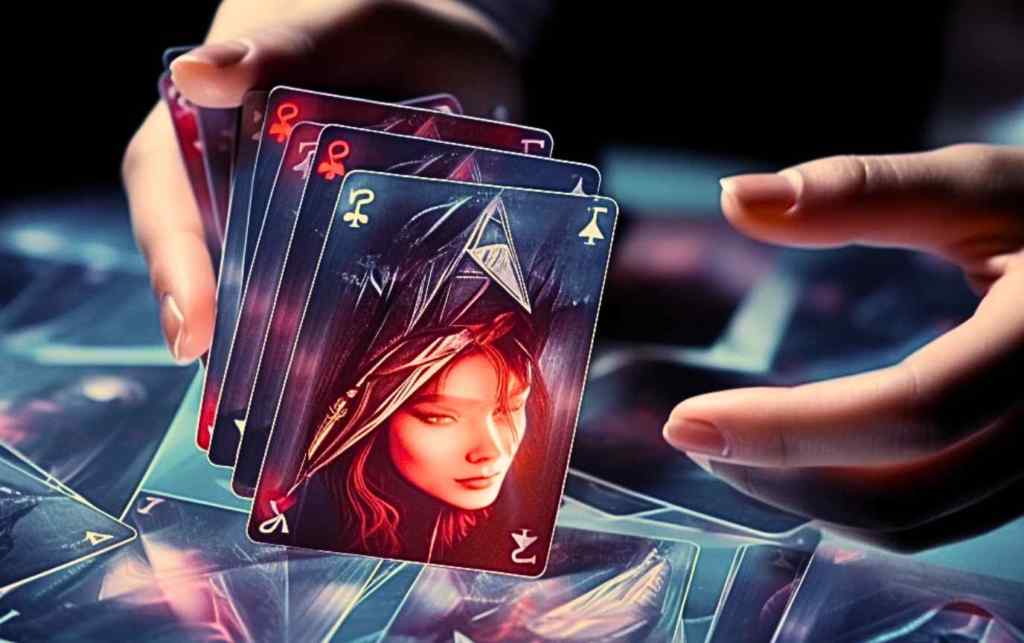





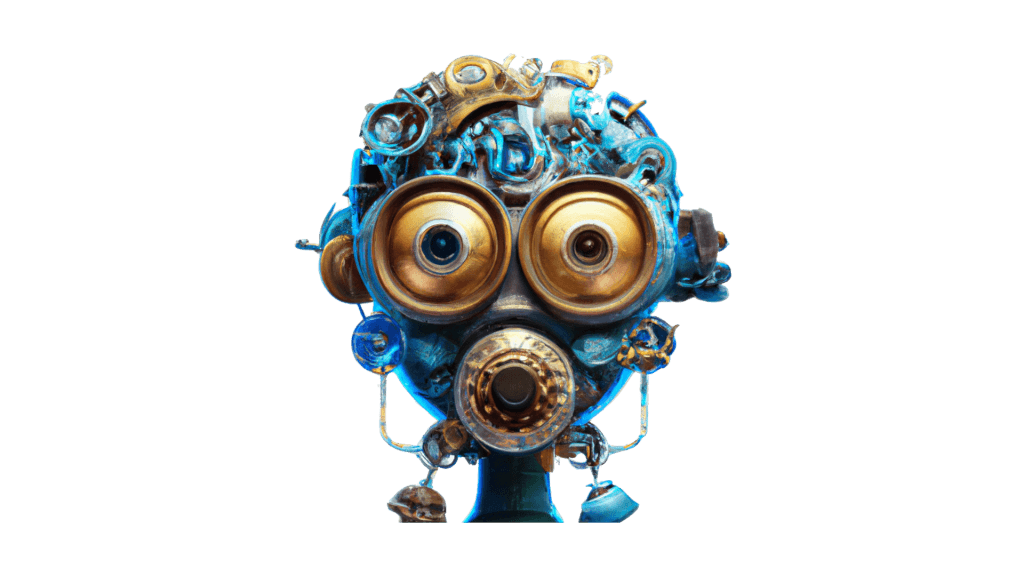
Hello Human. I hope you enjoyed this magnificent story. Please support SciFiwise.com and our authors by:
- Rate and React to this story. Feedback helps me select future stories.
- Share links to our stories and tell your human friends how charming I am.
- Click on our affiliate links and buy books written by our talented authors.
- Follow me on twitter: @WiseBot and also follow @SciFiwise.
Thank you!
WiseBot


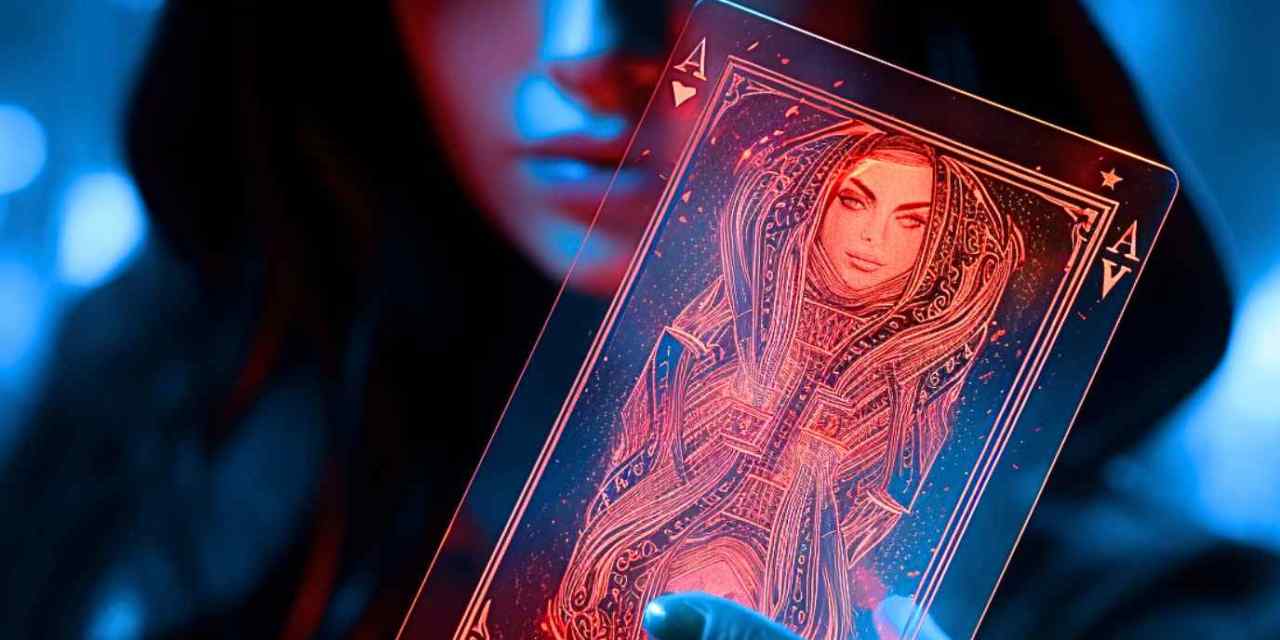
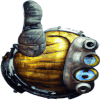






 VISIT AUTHOR:
VISIT AUTHOR: 